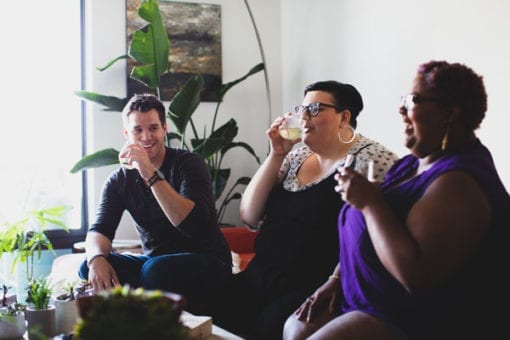Updated on 07/03/23
Family gatherings and social events can be difficult for those of us who are recovering from an eating disorder. Gathering, potlucks or social events combine two things: eating a meal that you don’t have control over and eating in front of family and friends. Each is a stressful scenario on its own, but especially so for someone trying to utilize alternative coping behaviors that aren’t their eating disorder behaviors (restriction, bingeing).
Let’s look at a few ways to make family gatherings and potlucks more enjoyable (or at least tolerable).
Be Prepared for Family Gatherings and Potlucks while in Eating Disorder Recovery
Give some thought to how you want to approach the upcoming meal. For example, if it’s a potluck, you can contribute a dish you are comfortable with. You might be able do this for a family gathering as well. If it helps your well-being and isn’t triggering, prepare a dish that you’d enjoy eating and sharing. On the flip side, if making a dish is triggering or uncomfortable, then don’t. Do what’s going to serve you best in your recovery.
Once you’re at the event, take your time deciding what you want to eat. Try to tune into what you really want and need to eat. And then make the best choices you can. It doesn’t have to be a “perfect” meal. We tend to put holiday meals on a pedestal, but ultimately, it’s just another meal. What makes family gatherings and potlucks special is the company. It’s a chance to enjoy people that we might not see often and reconnect with them.
Consider the HALT Acronym
Using HALT may help you to first consider attending to your vulnerability factors prior to attending a desired social event. HALT stands for the following:
- Hungry- When we let ourselves get too hungry, it can be hard to make good decisions about food or anything else. For those of us recovering from an eating disorder, letting ourselves get hungry and stay hungry may be restrictive behavior, which leads to binging. To help prevent an undesirable binge eating episode, stick to your eating routine, even on days where you have a social event. Eat your regular meals and snacks and treat the event as another meal.
- Angry- It’s okay to feel our emotions, including anger. Getting angry is natural, healthy and important to acknowledge. At times, women and femmes may struggle with anger, as it has been socialized not to get angry, not to confront people and to always be “nice.” It’s okay to get angry, but the challenge is to move through that emotion productively. This might mean taking some time to journal about our anger. It might mean taking to our therapist or a trusted friend about our anger. It might mean doing an activity that releases some of that anger, like going for a walk or screaming into a pillow. Anger is healthy, and so is finding ways to express it.
- Lonely. As humans, we need social connections. Isolating ourselves can lead to restriction or binge eating relapse. Social interactions can be stressful too, though. It’s good to discern which events you may want to attend even before setting foot into a situation. If you do attend an event, think of a couple of conversation starters. One of the best is genuinely asking, “How are you?” and then really listening to the answer. It’s also important to consider how to establish boundaries and what you think is right to talk (or not) about.
- Tired. Our culture values busyness and productivity. Sometimes we push ourselves because we have assignments to finish or work goals to meet. That can leave us feeling tired, which can also leave us feeling vulnerable. Take time to rest. It might mean taking a nap, committing to eight hours of sleep per night, or taking the time to do something restorative. There’s a lot of talk about self-care these days, and for good reason. We need to take care of ourselves, and there’s nothing wrong or selfish about taking the time to do it.
Consider using HALT to check in with yourself and consider what you might need to feel prepared for a family gathering.
Find Support
Facing a social event, potluck or family gathering can be intimidating, especially early in recovery. Reach out for help. Talk to your treatment team, talk to a supportive friend, or bring a friend with you to the event who you know will be supportive and protective of your recovery. It can be hard to admit that we need help, but we all do sometimes. We can’t recover in isolation, and we deserve support. We are worthy of other people’s time, attention and love.
If you are looking for treatment, currently in treatment or have recently finished, ask your friends and family for the support you need. People want to help, but they sometimes may not know how. Reach out. You don’t have to face a food-related event alone.
Melinda Sineriz is a freelance writer and fat acceptance advocate. Read more of her thoughts on Twitter or visit her website to learn more.
More from Center for Discovery:
